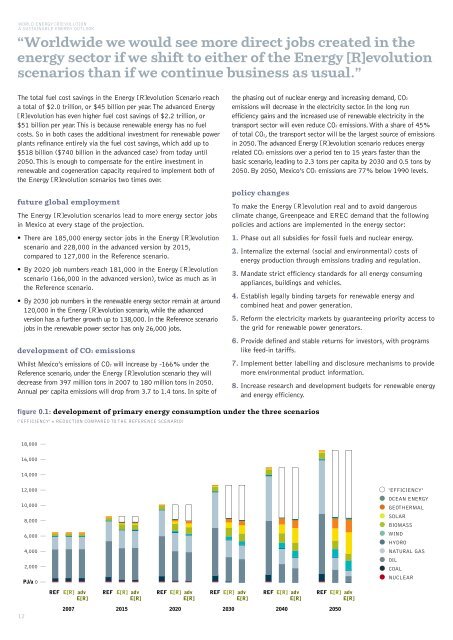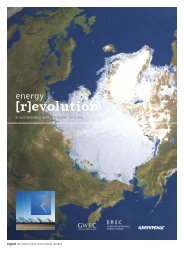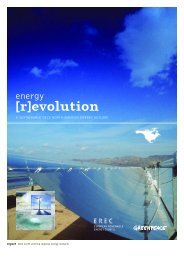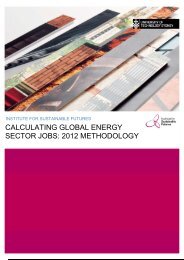download the mexico energy revolution scenario
download the mexico energy revolution scenario
download the mexico energy revolution scenario
Create successful ePaper yourself
Turn your PDF publications into a flip-book with our unique Google optimized e-Paper software.
WORLD ENERGY [R]EVOLUTION<br />
A SUSTAINABLE ENERGY OUTLOOK<br />
“Worldwide we would see more direct jobs created in <strong>the</strong><br />
<strong>energy</strong> sector if we shift to ei<strong>the</strong>r of <strong>the</strong> Energy [R]evolution<br />
<strong>scenario</strong>s than if we continue business as usual.”<br />
The total fuel cost savings in <strong>the</strong> Energy [R]evolution Scenario reach<br />
a total of $2.0 trillion, or $45 billion per year. The advanced Energy<br />
[R]evolution has even higher fuel cost savings of $2.2 trillion, or<br />
$51 billion per year. This is because renewable <strong>energy</strong> has no fuel<br />
costs. So in both cases <strong>the</strong> additional investment for renewable power<br />
plants refinance entirely via <strong>the</strong> fuel cost savings, which add up to<br />
$518 billion ($740 billion in <strong>the</strong> advanced case) from today until<br />
2050. This is enough to compensate for <strong>the</strong> entire investment in<br />
renewable and cogeneration capacity required to implement both of<br />
<strong>the</strong> Energy [R]evolution <strong>scenario</strong>s two times over.<br />
future global employment<br />
The Energy [R]evolution <strong>scenario</strong>s lead to more <strong>energy</strong> sector jobs<br />
in Mexico at every stage of <strong>the</strong> projection.<br />
• There are 185,000 <strong>energy</strong> sector jobs in <strong>the</strong> Energy [R]evolution<br />
<strong>scenario</strong> and 228,000 in <strong>the</strong> advanced version by 2015,<br />
compared to 127,000 in <strong>the</strong> Reference <strong>scenario</strong>.<br />
• By 2020 job numbers reach 181,000 in <strong>the</strong> Energy [R]evolution<br />
<strong>scenario</strong> (166,000 in <strong>the</strong> advanced version), twice as much as in<br />
<strong>the</strong> Reference <strong>scenario</strong>.<br />
• By 2030 job numbers in <strong>the</strong> renewable <strong>energy</strong> sector remain at around<br />
120,000 in <strong>the</strong> Energy [R]evolution <strong>scenario</strong>, while <strong>the</strong> advanced<br />
version has a fur<strong>the</strong>r growth up to 138,000. In <strong>the</strong> Reference <strong>scenario</strong><br />
jobs in <strong>the</strong> renewable power sector has only 26,000 jobs.<br />
development of CO2 emissions<br />
Whilst Mexico’s emissions of CO2 will increase by -166% under <strong>the</strong><br />
Reference <strong>scenario</strong>, under <strong>the</strong> Energy [R]evolution <strong>scenario</strong> <strong>the</strong>y will<br />
decrease from 397 million tons in 2007 to 180 million tons in 2050.<br />
Annual per capita emissions will drop from 3.7 to 1.4 tons. In spite of<br />
<strong>the</strong> phasing out of nuclear <strong>energy</strong> and increasing demand, CO2<br />
emissions will decrease in <strong>the</strong> electricity sector. In <strong>the</strong> long run<br />
efficiency gains and <strong>the</strong> increased use of renewable electricity in <strong>the</strong><br />
transport sector will even reduce CO2 emissions. With a share of 45%<br />
of total CO2, <strong>the</strong> transport sector will be <strong>the</strong> largest source of emissions<br />
in 2050. The advanced Energy [R]evolution <strong>scenario</strong> reduces <strong>energy</strong><br />
related CO2 emissions over a period ten to 15 years faster than <strong>the</strong><br />
basic <strong>scenario</strong>, leading to 2.3 tons per capita by 2030 and 0.5 tons by<br />
2050. By 2050, Mexico’s CO2 emissions are 77% below 1990 levels.<br />
policy changes<br />
To make <strong>the</strong> Energy [R]evolution real and to avoid dangerous<br />
climate change, Greenpeace and EREC demand that <strong>the</strong> following<br />
policies and actions are implemented in <strong>the</strong> <strong>energy</strong> sector:<br />
1. Phase out all subsidies for fossil fuels and nuclear <strong>energy</strong>.<br />
2. Internalize <strong>the</strong> external (social and environmental) costs of<br />
<strong>energy</strong> production through emissions trading and regulation.<br />
3. Mandate strict efficiency standards for all <strong>energy</strong> consuming<br />
appliances, buildings and vehicles.<br />
4. Establish legally binding targets for renewable <strong>energy</strong> and<br />
combined heat and power generation.<br />
5. Reform <strong>the</strong> electricity markets by guaranteeing priority access to<br />
<strong>the</strong> grid for renewable power generators.<br />
6. Provide defined and stable returns for investors, with programs<br />
like feed-in tariffs.<br />
7. Implement better labelling and disclosure mechanisms to provide<br />
more environmental product information.<br />
8. Increase research and development budgets for renewable <strong>energy</strong><br />
and <strong>energy</strong> efficiency.<br />
figure 0.1: development of primary <strong>energy</strong> consumption under <strong>the</strong> three <strong>scenario</strong>s<br />
(‘EFFICIENCY’ = REDUCTION COMPARED TO THE REFERENCE SCENARIO)<br />
18,000<br />
16,000<br />
14,000<br />
12,000<br />
10,000<br />
8,000<br />
6,000<br />
4,000<br />
2,000<br />
PJ/a 0<br />
REF E[R]<br />
adv<br />
E[R]<br />
REF E[R]<br />
adv<br />
E[R]<br />
REF E[R]<br />
adv<br />
E[R]<br />
REF E[R]<br />
adv<br />
E[R]<br />
REF E[R]<br />
adv<br />
E[R]<br />
REF E[R]<br />
adv<br />
E[R]<br />
‘EFFICIENCY’<br />
OCEAN ENERGY<br />
GEOTHERMAL<br />
SOLAR<br />
BIOMASS<br />
WIND<br />
HYDRO<br />
NATURAL GAS<br />
OIL<br />
• COAL<br />
NUCLEAR<br />
12<br />
2007<br />
2015<br />
2020<br />
2030<br />
2040<br />
2050



![Energy [R]evolution - European Commission](https://img.yumpu.com/49109324/1/184x260/energy-revolution-european-commission.jpg?quality=85)


![5905 gp [eu rev]csfr4.qxd - Energy [R]evolution](https://img.yumpu.com/42305023/1/184x260/5905-gp-eu-revcsfr4qxd-energy-revolution.jpg?quality=85)


![5905 gp [eu rev]csfr4.qxd - Energy [R]evolution](https://img.yumpu.com/28729264/1/184x260/5905-gp-eu-revcsfr4qxd-energy-revolution.jpg?quality=85)